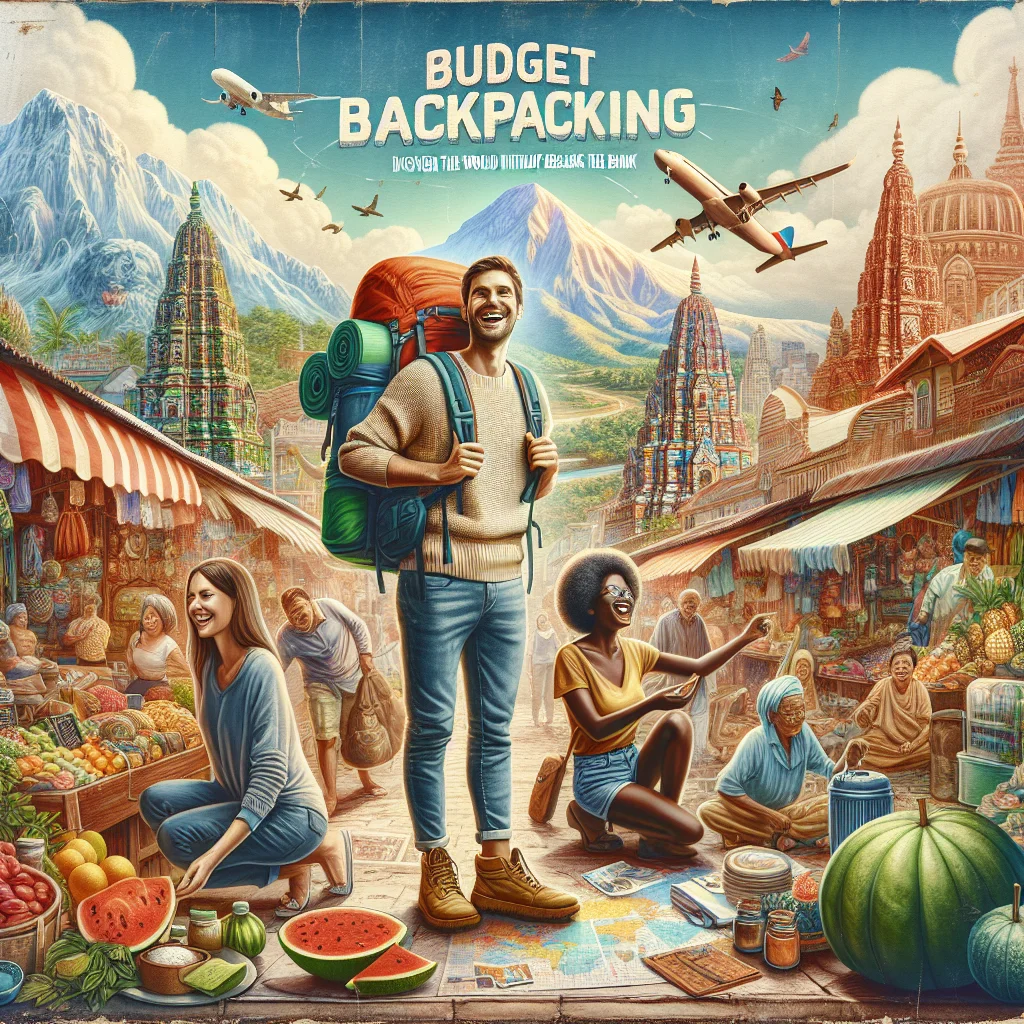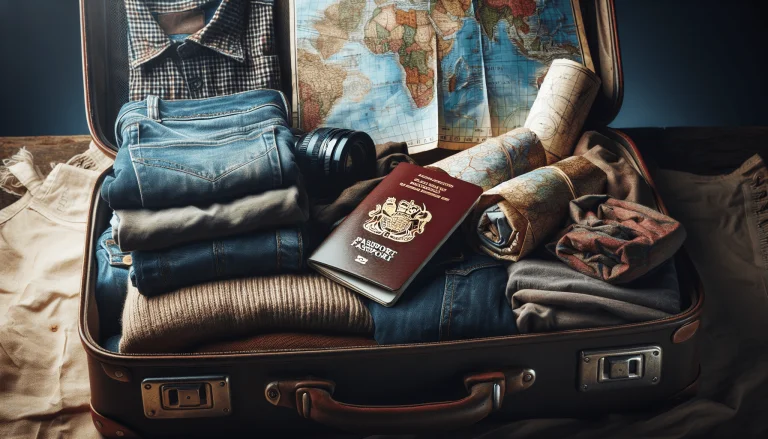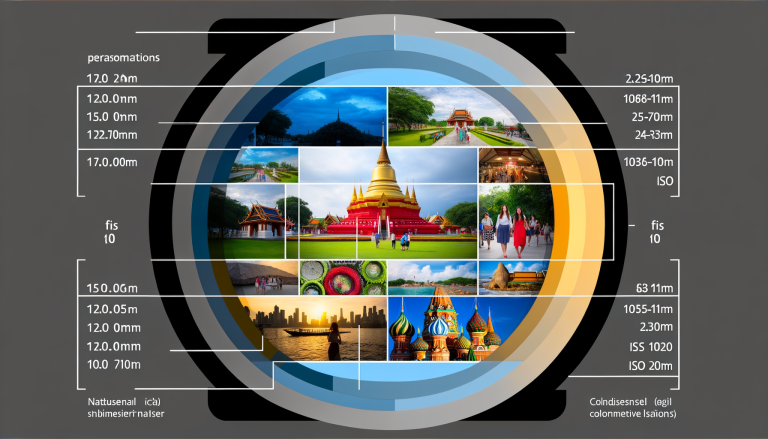Budget Backpacking: Discover The World Without Breaking The Bank
Are you a traveler with a passion for exploring the world, but limited funds? Look no further! The article “Budget Backpacking: Discover The World Without Breaking The Bank” is here to help you embark on unforgettable adventures without emptying your wallet. Packed with valuable tips and tricks, this article caters to budget-conscious wanderers like yourself, providing destination recommendations, travel planning advice, and insights into making the most out of every budget travel experience. So, get ready to uncover hidden gems, create unforgettable memories, and truly discover the world without breaking the bank!
Understanding Budget Backpacking
What is budget backpacking?
Budget backpacking refers to a style of travel that emphasizes affordability and cost-consciousness. It involves traveling on a tight budget, typically with a limited amount of money allocated for accommodation, transportation, food, and entertainment. Budget backpackers often choose to carry their essentials in a backpack, which allows for increased mobility and flexibility.
Why choose budget backpacking?
There are several reasons why budget backpacking is a popular choice among travelers. Firstly, it allows you to stretch your travel budget and make your money last longer. By cutting costs on accommodation, transportation, and other expenses, you can travel for a longer period of time, visit more destinations, and experience a wider range of activities. Additionally, budget backpacking often leads to more authentic and immersive travel experiences. By staying in budget accommodations, eating at local eateries, and interacting with locals, you can get a better sense of the local culture and way of life. Budget backpacking also encourages a minimalist lifestyle, as you learn to prioritize experiences over material possessions.
Challenges of budget backpacking
While budget backpacking offers numerous benefits, it is not without its challenges. One of the main challenges is the need to constantly search for the best deals and discounts. This can involve spending time researching and comparing prices for accommodation, transportation, and activities. Another challenge is the need to be flexible and adaptable. Budget backpacking often involves staying in shared dormitories, using public transportation, and being open to trying new and unfamiliar foods. It requires a certain level of patience and willingness to embrace the unexpected. Finally, budget backpacking can be physically demanding, especially if you are carrying a heavy backpack for long periods of time or traversing uneven terrains.
Planning Your Budget Backpacking Trip
Setting up a travel budget
Before embarking on your budget backpacking trip, it is essential to set up a travel budget. Start by determining how much money you can allocate for your trip. Consider your current financial situation, including any savings, income, or financial commitments. Once you have a budget in mind, allocate a portion of it to different expenses, such as accommodation, transportation, food, and activities. Be realistic about your spending habits and account for unexpected expenses. Consider using budgeting apps or spreadsheets to keep track of your expenses and ensure that you stay within your budget.
Prioritizing travel activities
When planning a budget backpacking trip, it is important to prioritize your travel activities. Make a list of the activities and attractions that are most important to you and allocate a portion of your budget to them. This could include visiting iconic landmarks, participating in adventure sports, or attending local festivals. By prioritizing your activities, you can make sure that you allocate your money where it matters most to you. Additionally, consider exploring free or low-cost activities, such as hiking, exploring local markets, or visiting public parks, which can help stretch your budget further.
Choosing the right travel season
Another important factor to consider when planning a budget backpacking trip is the travel season. Traveling during off-peak seasons can often result in significant cost savings. Accommodation and transportation prices tend to be lower, and popular tourist destinations are less crowded. Research the peak and off-peak seasons for your desired destinations and plan your trip accordingly. Keep in mind that certain destinations may have specific seasons that offer unique experiences, such as festivals or wildlife migrations. By choosing the right travel season, you can enjoy your trip while minimizing expenses.
Deciding on travel duration
The duration of your budget backpacking trip can have a significant impact on your overall expenses. A longer trip may require a more meticulous budgeting approach, as you will need to stretch your funds over a longer period of time. However, a longer trip also offers the opportunity to slow down, immerse yourself in local culture, and truly explore a destination. On the other hand, a shorter trip may allow you to experience more destinations within a limited budget. Consider your personal preferences and priorities when deciding on the duration of your trip, and be mindful of the corresponding financial implications.
Selecting Cost-Effective Destinations
Destinations with lower cost of living
When planning a budget backpacking trip, consider selecting destinations with a lower cost of living. Some countries and cities offer more affordable options for accommodation, transportation, and food. Southeast Asia, for example, is known for its budget-friendly destinations such as Thailand, Vietnam, and Cambodia. Eastern Europe, Central America, and parts of South America are also popular choices for budget travelers. Research the cost of living in different destinations and compare prices for essentials such as accommodation and food to find a destination that is within your budget.
Countries with cheap public transportation
Opting for destinations with cheap and efficient public transportation can greatly reduce your travel expenses. Look for countries or cities that have well-connected public transportation systems, such as buses, trains, or trams. These modes of transportation are often significantly cheaper than renting a car or taking taxis. Furthermore, public transportation allows you to immerse yourself in the local culture and provides opportunities to interact with other travelers. Consider using apps or websites that provide public transportation maps and schedules to navigate your destination easily.
Lesser-known travel destinations
Choosing lesser-known or off-the-beaten-path destinations can also be a cost-effective option for budget backpackers. Popular tourist destinations often come with higher prices for accommodation, food, and activities due to the high demand. However, by exploring lesser-known destinations, you can often find cheaper options and experience a more authentic travel experience. Research destinations that may not be as well-known but still offer unique attractions and experiences. These hidden gems can provide a more budget-friendly and memorable trip.
Affordable Accommodation Options
Hostels and backpacker lodges
One of the most popular and affordable accommodation options for budget backpackers is staying in hostels or backpacker lodges. Hostels offer dormitory-style rooms with shared facilities, allowing you to save money by only paying for a bed rather than a private room. In addition to being budget-friendly, hostels often provide opportunities to socialize with other travelers, participate in group activities, and receive local tips and recommendations. Some hostels even offer private rooms or female-only dormitories for added comfort and security.
Couchsurfing and home exchange
For those seeking a more unique and cost-effective accommodation experience, couchsurfing and home exchange are viable options. Couchsurfing allows you to stay with local hosts for free, providing an opportunity to connect with locals and gain insights into the local culture. Home exchange involves swapping homes with another traveler, allowing you to stay in their home while they stay in yours. This can be a great way to save money on accommodation while experiencing life as a local in a different destination.
Booking accommodations during off-peak seasons
Booking accommodations during off-peak seasons can result in significant cost savings. As mentioned earlier, traveling during the off-peak season often means lower prices and less crowded accommodations. Many hotels and guesthouses offer discounted rates to attract travelers during slower periods. Take advantage of these lower rates by planning your trip accordingly. Additionally, consider booking accommodations in advance to secure the best deals and availability.
Budgeting for Transportation
Taking advantage of discounted air tickets
Airfare can often be one of the largest expenses when planning a budget backpacking trip. However, there are several strategies to help you find discounted air tickets. Start by using flight comparison websites or apps to compare prices from different airlines. Be flexible with your travel dates and consider booking flights on weekdays, as they tend to be cheaper than weekends. Additionally, sign up for airline newsletters or follow them on social media to stay informed about flash sales or special promotions.
Using public transportation
As mentioned earlier, using public transportation is a cost-effective option for budget backpackers. Buses, trains, and trams are often cheaper than renting a car or taking taxis, especially for long-distance travel. Research the public transportation options available in your destination and familiarize yourself with the schedules and routes. This will not only help you save money but also provide opportunities to interact with locals and experience the destination from a different perspective.
Car/bike rentals vs. taxi service
In some cases, renting a car or bike may be a more convenient option, especially if you plan on visiting remote areas or having more flexibility in your itinerary. However, it is important to consider the cost implications. Renting a car or bike can be expensive, especially when you factor in the cost of fuel, parking fees, and insurance. If you do opt for a rental, consider sharing the expenses with other travelers to reduce costs. Alternatively, using ride-sharing services or local taxis can be a more affordable option for short distances.
Eating and Drinking on a Budget
Street food and local cuisine
One of the best ways to experience a destination’s culture and cuisine on a budget is by indulging in street food and local dishes. Street food stalls and local eateries often offer delicious and affordable meals that are a reflection of the local culture. Be adventurous and try local specialties, but also be mindful of food safety and hygiene practices. Research popular street food markets or ask locals for recommendations to find the best and safest options.
Eating at local markets
Local markets are not only a feast for the senses but also a budget-friendly option for budget backpackers. Many countries have vibrant local markets where you can find fresh produce, snacks, and local delicacies at affordable prices. Shopping for ingredients at local markets and cooking your own meals, especially if you have access to a communal kitchen in your accommodation, can be a great way to save money and have a unique culinary experience. Additionally, some markets also have food stalls or small eateries where you can enjoy inexpensive meals.
Limiting dining at expensive restaurants
While it can be tempting to splurge on fine dining experiences, limiting the number of meals you have at expensive restaurants can significantly reduce your expenses. Save restaurant visits for special occasions or for trying local dishes that are not easily available elsewhere. Instead, opt for budget-friendly options such as street food, local eateries, or cooking your own meals. By being mindful of your dining choices, you can enjoy delicious meals without breaking the bank.
Keeping Entertainment Costs Low
Free city attractions and excursions
Many cities offer a range of free or low-cost attractions and excursions that can be enjoyed on a budget backpacking trip. Research the city’s tourism board website or inquire at local visitor centers for information on free walking tours, parks, gardens, or museums with free admission days. Take advantage of these opportunities to explore the city and learn about its history and culture without spending a fortune.
Discounted entry to museums and historical sites
While some museums and historical sites may have an entrance fee, many offer discounted or even free admission on certain days or for specific groups of visitors. Research the opening hours and admission policies of the attractions you wish to visit, and plan your itinerary accordingly. Additionally, consider purchasing a city pass or attraction pass that offers discounted admission to multiple attractions. These passes can often provide significant savings for budget backpackers.
Taking advantage of local festivals and events
Attending local festivals and events is not only a great way to immerse yourself in the local culture but also a budget-friendly entertainment option. Many cities and towns host festivals, concerts, or cultural events that are free or have low-cost tickets. Research the local events calendar for your destination and plan your trip to coincide with these events. By attending local festivals and events, you can experience the vibrant energy of the destination while creating lasting memories.
Smart Money Management While Traveling
Avoiding unnecessary bank fees
When traveling on a budget, it is important to avoid unnecessary bank fees that can eat into your travel funds. Before your trip, research the fees associated with using your debit or credit card abroad. Some banks charge foreign transaction fees or ATM withdrawal fees, which can add up over time. Consider opening a travel-friendly bank account or obtaining a prepaid travel card that offers competitive exchange rates and minimal fees. Additionally, notify your bank about your travel plans to avoid any card holds or restrictions.
Using a budget tracking app
A budget tracking app can be a valuable tool for budget backpackers. There are numerous apps available that allow you to input your expenses, set spending limits, and track your overall budget. By regularly updating the app with your expenses, you can easily monitor your spending and ensure that you stay within your budget. Some apps even provide insights and analysis of your spending habits, which can help you make informed financial decisions while traveling.
Carrying local currency for emergencies
While credit and debit cards are convenient for most transactions, it is important to carry some local currency for emergencies or situations where cards may not be accepted. Exchange a small amount of cash before your trip or withdraw cash from ATMs upon arrival. Keep the cash secure in a hidden travel wallet or money belt. Having local currency on hand can also be useful in cases where smaller establishments or markets only accept cash.
Packing Essentials for Budget Backpacking
Travel items that save money
When packing for a budget backpacking trip, consider including items that can help save money in the long run. For example, a refillable water bottle can save you from constantly purchasing bottled water and help reduce plastic waste. Packing a travel towel that dries quickly can save you from renting or purchasing towels at accommodations that may charge an additional fee. Additionally, a small portable laundry kit can allow you to wash your clothes while traveling, reducing the need for expensive laundry services.
Lightweight packing to offer mobility
Opting for lightweight and versatile travel gear is essential for budget backpackers. A lightweight backpack or suitcase can make a significant difference in terms of mobility and comfort. Choose clothing items that are lightweight, quick-drying, and can be easily layered for different weather conditions. Packing versatile clothing pieces that can be mixed and matched will also help you save space and reduce the need for excessive luggage.
Quality backpack and travel accessories
Investing in a quality backpack and essential travel accessories is crucial for a successful budget backpacking trip. Your backpack will be your constant companion, so it is important to choose one that is durable, comfortable, and fits your body well. Consider features such as padded straps, multiple compartments, and a rain cover. Additionally, invest in travel accessories such as a sturdy lock, travel adapter, and a portable charger to ensure that you stay connected and secure throughout your trip.
Avoiding Common Budget Backpacking Mistakes
Overbudgeting or underbudgeting
One common mistake that budget backpackers make is either overbudgeting or underbudgeting. Overestimating your expenses can result in unnecessary restrictions or missed opportunities to experience the destination fully. Underestimating your expenses, on the other hand, can lead to financial stress and limitations once you are on the road. To avoid this mistake, do thorough research on the cost of living, transportation, and activities in your chosen destinations. It is always better to have a slightly higher budget than initially planned to account for unforeseen expenses.
Not buying travel insurance
Travel insurance is often overlooked by budget backpackers due to its additional cost. However, it is crucial to have travel insurance to protect yourself against unforeseen circumstances such as medical emergencies, trip cancellations, or lost belongings. Consider purchasing a comprehensive travel insurance policy that covers your specific needs. Read the policy details carefully to understand the coverage and exclusions, and ensure that you have a copy of your insurance documents easily accessible during your trip.
Falling for tourist traps
Tourist traps are common in popular tourist destinations and can quickly drain your travel budget. These traps often involve overpriced souvenirs, unnecessary guided tours, or attractions that are not worth the high admission fees. To avoid falling for tourist traps, research your destination in advance, read reviews from other travelers, and ask locals for recommendations. Additionally, be cautious of street vendors or individuals offering deals that seem too good to be true. Use your judgment and trust your instincts when making purchasing decisions.





